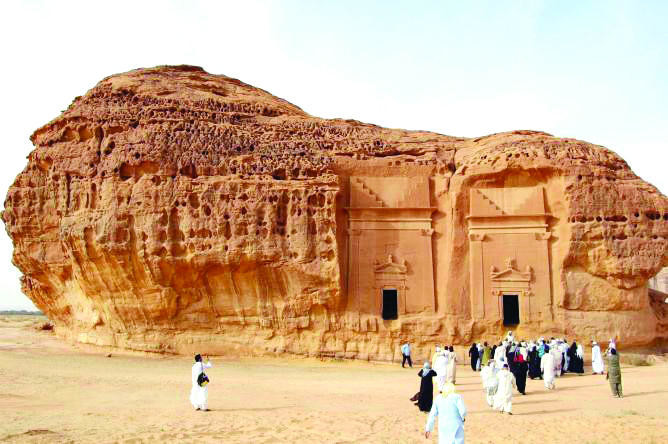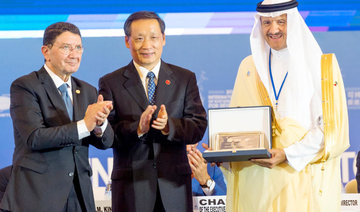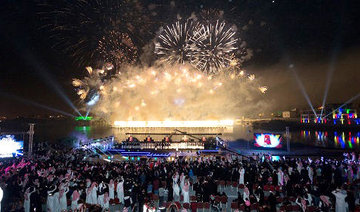RIYADH: Saudi Arabia has been a unique travel destination for centuries, offering a wide range of tourism options to visitors, from religious tourism to visiting the historical wonders and seeing the Kingdom’s natural beauty.
While the two holy cities of Makkah and Madinah, with their rich Islamic history epitomizing religious tourism, the natural and heritage wonders are best visited in picturesque Abha, Al-Baha, Al-Turaif distirct in historic Diriyah, Riyadh, historic Jeddah, the mountain resorts of Taif, heritage rock arts in Hail and the majesty of ancient Nabatean tombs in Madain Saleh whereas the multicolored coral reefs of the Red Sea remained a well-kept secret.
Unveiling an ambitious plan for tourism revolution to make Saudi Arabia a world-class travel destination, Crown Prince Mohammed bin Salman in August announced the launch of “The Red Sea” tourism project.
Envisioned as a resort built across a lagoon of 50 pristine islands, the ambitious tourism project will be situated in one of the world’s last natural hidden treasures between the cities of Um Laj and Al-Wajh on the west coast.
It will be developed in partnership with the world’s leading hospitality firms.
Situated just a few kilometers from one of the most diverse Saudi natural reserves in Harrat Al-Rahat, the resort promises to be a blissful coastal island retreat set against a backdrop of the ancient ruins at Madain Saleh, renowned for its natural beauty and heritage value.
With the completion of the project’s first phase expected by 2022, which will include development of hotels, luxury residential units and all logistical infrastructure such as air, land and sea transport hubs, visitors will be able to explore hidden treasures including a natural reserve that boasts a stunning diversity of flora and fauna.
Moreover, an array of marine-oriented resort developments will allow for unparalleled scuba diving among stunning coral reefs.
The project, upon completion, will form an archipelago that is home to environmentally protected coral reefs, mangroves and several endangered marine species, including the hawksbill sea turtle, a critically endangered sea turtle belonging to the family Cheloniidae.
Moreover, the area boasts dormant volcanoes, the most recently active of which recorded history of activity dating back to the 17th century AD.
The natural reserve, which is part of the ambitious project, is inhabited by rare wildlife including leopards, wolves, wildcats and falcons.
Furthermore, the Red Sea project will offer parachuting, trekking and rock climbing. With the tourism sector witnessing a remarkable growth, becoming the second most important sector in the Kingdom after the energy sector, this significant project is expected to spearhead the diversification of the Saudi leisure industry as envisioned under Vision 2030.
In a major boost to the travel and tourism sector, the Public Investment Fund (PIF) announced the development of a new company to act as its investment arm in the entertainment sector to make deals with strategic partners, in a quest to provide more fun and entertainment at home that will help reduce foreign travel, as well as spending on vacations abroad.
Announcing this, the PIF on Wednesday said that this company will expand the scope and variety of entertainment offerings that conform to the latest global standards.
The new company, with an initial capitalization of SR10 billion, will play an active investment role in various areas of the entertainment sector, and seek to attract strategic partnerships to build the cultural eco-system within the Kingdom.
The new company’s establishment is consistent with the ambitions within Vision 2030 to increase the Kingdom’s cultural and entertainment offering, to create new employment opportunities, and to make use of the wealth of talent and energy among Saudi youth.
The company is planning to invest in a number of entertainment projects, which includes an entertainment complex that will be launched by 2019, and is expected to generate more than 22,000 local jobs and contribute SR8 billion ($2.133 billion) to the economy by 2030. An estimated 50 million visitors annually are also expected by that time.
Welcoming the move, Majed bin Abdullah Al-Hedayan, a senior legal adviser and an expert in foreign direct investments, told Arab News: “As there were few entertainment attractions available in the Kingdom, it is indeed a significant initiative to have more entertainment and fun at home and take fewer vacations abroad, which will help cut on spending abroad.”
Al-Hedayan underlined that in line with Vision 2030, the General Authority for Entertainment was established to organize and develop the leisure sector in the Kingdom; provide entertainment and recreational opportunities for all segments of the society in all regions in the Kingdom; enrich life and make it cheerful; and stimulate the role of the private sector in building and developing entertainment activities.
In a great leap forward, the PIF is now establishing a new company as an investment arm in the growing leisure sector to play an effective investment role in developing cultural and recreational elements in the Kingdom.
Furthermore, the Kingdom has already reached an agreement to open a Six Flags theme park in Riyadh, and announced the Red Sea tourism project on the western coast, paving the way for partnerships with the world’s leading tourism companies.
Riyadh is also witnessing massive-scale growth in tourism in both urban and rural areas.
The hospitality sector, in particular, has registered exponential expansion, and the capital is now a shopping hub with a wide range of shopping centers, malls and hypermarkets.
With the tourism sector growing by leaps and bounds recording faster rates of growth with the Saudi Commission for Tourism and National History (SCTH) expanding its footprint across the Kingdom since its formation in 2000, there is a marked difference with emphasis on all aspects of tourism as an industry par excellence, which not only promotes domestic tourism and protect Kingdom’s rich cultural heritage, but at the same time, creates employment avenues for Saudi youth.
Moreover, the SCTH in July announced the launch of six initiatives that have been approved under the National Transformation Program (NTP) 2020. The launch of these initiatives is carried out by the SCTH under the National Tourism Development and National Heritage project of the Kingdom, which is consistent with its strategy approved by the Cabinet in 2004.
Mohammed Al-Nashmi, head of the achievements of the Vision 2030 at the SCTH, said that the commission has begun revising its strategy to meet the “Vision 2030.” The government budget for fiscal year 2017 covered all national heritage and tourism initiatives, 15 of which belong to the SCTH and 16 to its partners.
The total amount of the fund allocated to initiatives of the SCTH and its partners is approximately SR9.93 billion, 40 percent of which will be paid to the SCTH and 60 percent to its partners in government institutions. Total private sector investment is expected to reach SR16 billion, representing 64 percent of total expenditures until 2020.
The SCTH initiatives include “The Custodian of the Two Holy Mosques Program of Kingdom’s Cultural Heritage Care,” the first phase of which includes 79 projects under the initiatives of the NTP 2020, proposed during the first quarter of 2017. The SCTH will undertake rehabilitation and operation of 15 handicraft centers to raise their total to 17. In addition, it will rehabilitate 18 urban heritage sites, bringing their total to 28, and establish 18 regional museums to bring the total in the Kingdom to 24.
SCTH will also rehabilitate 80 archaeological sites, and ready them for the public, bringing their total to 155, in addition to registering three more sites on UNESCO’s World Heritage List, bringing the Kingdom’s total registered sites to seven.
The UNESCO included Historic Jeddah and the Hail Rock Arts in the World Heritage List in consecutive years during the 38th UNESCO world heritage committee session in Qatar (2014) and 39th session of UNESCO world heritage committee in Bonn, Germany (2015).
The Hail Rock Arts are the fourth UNESCO heritage site in the Kingdom as earlier, UNESCO declared Madain Saleh as a site of patrimony in 2008, and it became Saudi Arabia’s first World Heritage Site.
It was chosen for its well-preserved remains from late antiquity, especially the 131 rock-cut monumental tombs, with their elaborately ornamented facades of the Nabatean kingdom.
Subsequently, the Kingdom mounted a concerted effort to further upgrade heritage tourism infrastructure and other facilities at historical and cultural sites as part of its effort to eventually get other historical sites of the Kingdom included in the World Heritage List. The Turaif district in Al-Diriyah was declared a UNESCO World Heritage Site in 2010.
The registration of these four heritage sites plays vital role toward promoting heritage tourism in the Kingdom.
Acknowledging the continuous effort, the UN World Tourism Organization (UNWTO), at its 22nd session held in China, honored Prince Sultan bin Salman, president of the Saudi SCTH on Sept.13. for his exemplary support of global tourism, the UNWTO’s efforts and his innovative initiatives to promote tourism in the Kingdom.
UNWTO Secretary-General Taleb Rifai stressed that this is the first tribute that is given to a person who had given much effort and time for the success of tourism in the world.
Saudi Arabia witnessing a remarkable growth in tourism industry
Saudi Arabia witnessing a remarkable growth in tourism industry

Saudi Arabia condemns remarks by US ambassador to Israel on Middle East, calls for clarification

RIYADH: Saudi Arabia has strongly condemned remarks made by the US ambassador to Israel suggesting that Israeli control over the entire Middle East would be acceptable, describing the comments as reckless and a violation of international law.
US envoy to Israel Mike Huckabee said it would be acceptable if Israel took control of the entire Middle East, including the West Bank, on Saturday.
Huckabee suggested that he would not object if Israel were to take most of the Middle East.
In a statement, the Ministry of Foreign Affairs said it “categorically denounced” the comments, rejecting what it described as irresponsible statements that contravene international law, the United Nations Charter and established diplomatic norms.
The ministry said the remarks represented a dangerous precedent, particularly as they came from a US official, and amounted to a disregard for relations between the US and countries across the region.
It warned that such positions carry grave consequences and threaten global peace and security by inciting hostility toward the peoples and states of the Middle East, while undermining the foundations of the international order based on respect for sovereignty and internationally recognised borders.
Saudi Arabia called on the US State Department to clarify its position on the remarks, stressing that the proposal was rejected by peace-loving nations around the world.
The Kingdom reaffirmed its firm opposition to any actions or statements that infringe on the sovereignty, borders or territorial integrity of states, reiterating that a just and comprehensive peace can only be achieved by ending the occupation and implementing a two-state solution.
That solution, the statement said, must include the establishment of an independent Palestinian state along the 1967 borders, with East Jerusalem as its capital.














